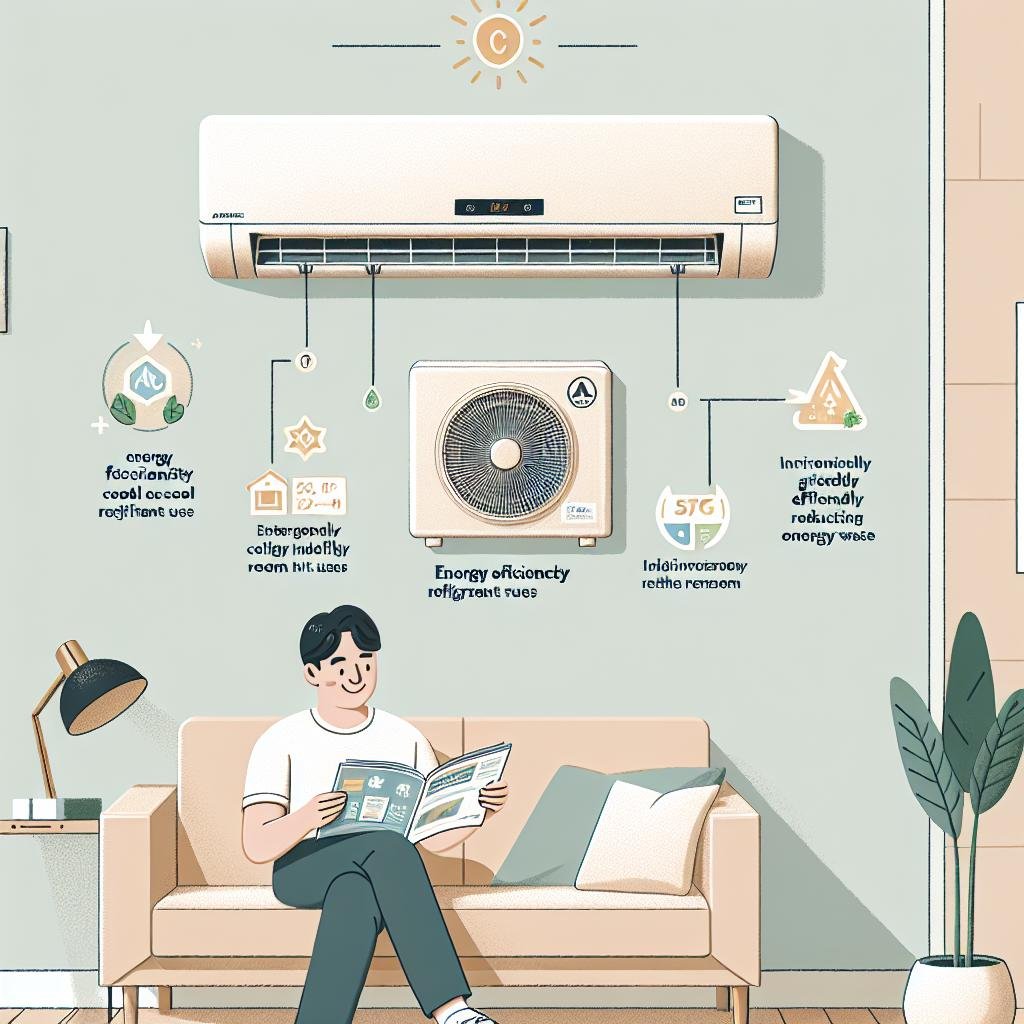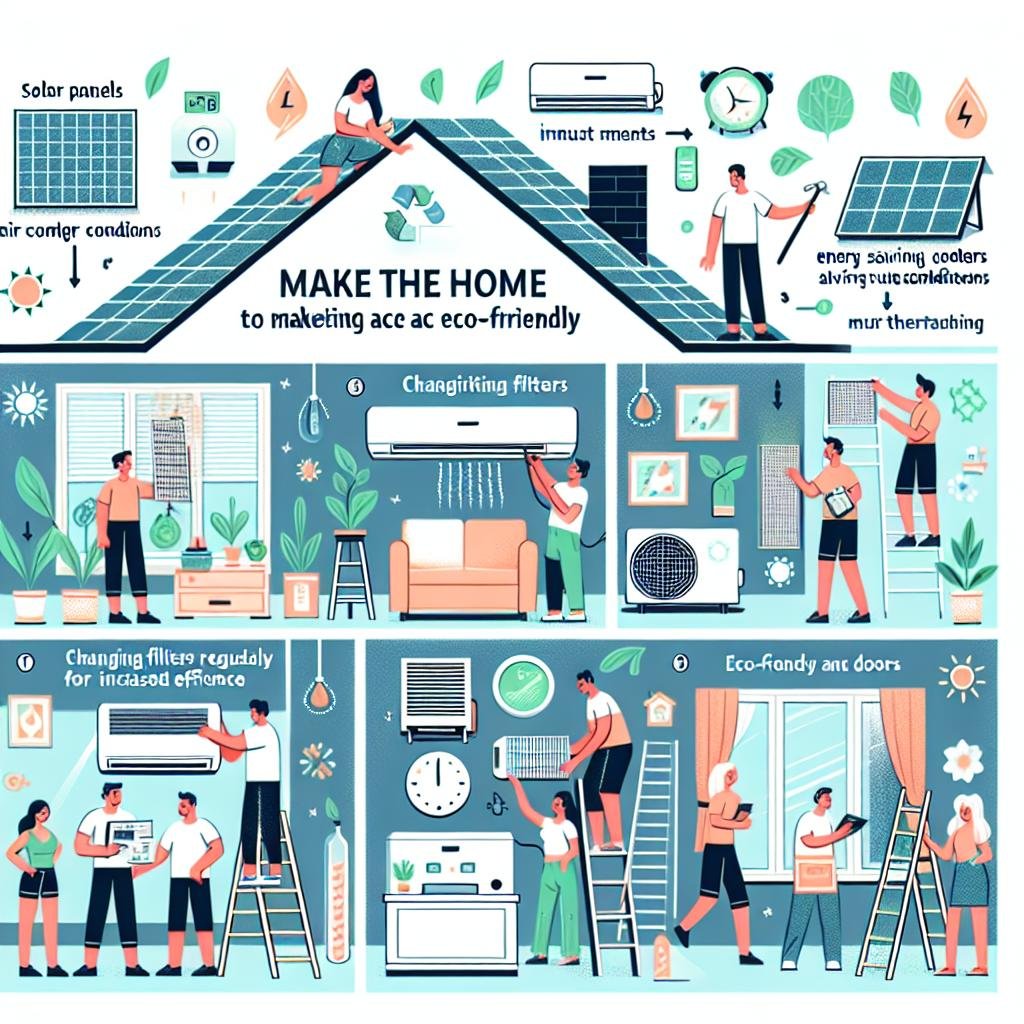Welcome to a cooler, greener world! As the temperatures rise and the need for efficient cooling solutions becomes more pressing, many are turning to mini split AC systems to keep their spaces comfortable. But have you ever stopped to consider the environmental impact of these sleek and modern systems? In this article, we will dive into the world of mini split AC systems and explore how their efficiency can help reduce our carbon footprint and protect the planet we call home. So sit back, relax, and let’s uncover the hidden eco-friendly benefits of staying chill with mini splits.
Exploring the Eco-Footprint of Traditional Cooling Methods
When considering our quest to maintain a comfortable living environment, traditional cooling methods such as ceiling fans, evaporative coolers, and the ubiquitous central air conditioning systems often come to mind. These time-tested solutions have their perks but also leave significant environmental footprints. For instance, ceiling fans may be energy-efficient, but they merely circulate air, often requiring supplementary cooling systems to genuinely beat the heat. Evaporative coolers, while consuming less electricity, utilize substantial amounts of water, posing an issue in arid regions. Central air conditioning brings comfort but at a high price in terms of energy consumption and greenhouse gas emissions.
Let’s break down some key facets of these traditional methods:
- Ceiling Fans: Low energy usage but limited cooling capacity.
- Evaporative Coolers: Effective in dry climates but high water usage.
- Central Air Conditioning: Comprehensive cooling but substantial energy consumption.
| Method | Pros | Cons |
|---|---|---|
| Ceiling Fans | Energy Efficient | Limited Cooling |
| Evaporative Coolers | Low Electricity Usage | High Water Usage |
| Central Air Conditioning | Consistent Cooling | High Energy Consumption |
While these methods have served us well, it’s essential to recognize their limitations in the context of sustainable living. As we pivot towards more eco-friendly solutions, understanding the balance between comfort and environmental impact becomes crucial.

Why Mini Split AC Systems Stand Out in Sustainability
Mini split AC systems are revolutionizing the way we approach home cooling by embracing **sustainable technology**. Unlike traditional HVAC systems, mini splits don’t rely on ductwork, which can cause significant energy loss—up to 30%. This direct method of delivering cool air drastically reduces wasted energy, making mini splits a more environmentally friendly choice. Furthermore, their **inverter technology** allows the system to adjust the compressor speed to meet cooling demands, resulting in greater efficiency and less wear-and-tear over time. By using **R-410A refrigerant**, which does not deplete the ozone layer, these systems minimize their environmental footprint even further.
Another standout feature of mini split AC systems is their ability to promote energy conservation through **zone cooling**. This means you can cool specific areas of your home without having to chill the entire space, thus reducing overall energy consumption. Here are some key benefits:
- **Reduced Energy Consumption**: Only cool the rooms you use.
- **Easier Installation**: No need for extensive ductwork.
- **Quieter Operation**: Enjoy peace while staying cool.
Take a look at how mini split systems compare with traditional HVAC:
| Feature | Mini Split AC | Traditional HVAC |
|---|---|---|
| Energy Efficiency | High | Moderate |
| Installation | Simple | Complex |
| Operational Noise | Low | High |
Unveiling the Benefits: Energy Savings with Mini Split Systems
With the rise of environmentally friendly technologies, mini split systems have emerged as an efficient and eco-friendly cooling solution. One of the standout benefits of these systems is their impressive energy-saving capabilities. Here’s a quick peek into why they’re a go-to choice for sustainable cooling:
- Energy Efficiency: Mini split systems leverage inverter technology to regulate the compressor speed, ensuring optimal cooling with minimal energy wastage.
- Zone Cooling: Since these systems allow for individual control of different zones, you can cool specific areas without consuming power on unoccupied spaces, promoting energy conservation.
These unparalleled characteristics not only reduce electricity bills but also minimize carbon footprints, making them a stellar choice for both your wallet and the planet. To illustrate their impact, consider the following comparison:
| Cooling Solution | Annual Energy Consumption (kWh) | CO2 Emissions (kg) |
|---|---|---|
| Traditional HVAC System | 4000 | 1600 |
| Mini Split System | 2500 | 1000 |
It’s clear that mini split systems offer a significant reduction in both energy usage and environmental impact, proving to be a smart investment for those keen on embracing sustainable living.

Greening Your Home: Practical Tips for an Eco-Friendly AC Setup
When looking to green your home, incorporating practical elements into your air conditioning setup can make a significant difference. **Mini Split AC systems** are a standout choice due to their efficiency and lower environmental impact. These systems allow for **zoned cooling**, meaning you can cool specific areas of your home without the energy waste associated with central units. This targeted approach not only reduces your carbon footprint but also leads to notable savings on your energy bills. Opting for models with **high SEER (Seasonal Energy Efficiency Ratio)** ratings ensures you are choosing units that use less electricity and are more environmentally friendly.
Integrating smart technology can further enhance the eco-friendliness of your cooling system. Consider the benefits of **smart thermostats** that learn your schedule and adjust the temperature automatically, or **AC units with app controls** for remote operation. These small investments can lead to big environmental savings. Additionally, prioritize regular maintenance: a well-maintained system operates more efficiently and lasts longer. Simple steps, like frequently cleaning or replacing filters, can contribute significantly to reducing your AC’s energy consumption.
| Eco-Friendly Features | Advantages |
|---|---|
| High SEER Ratings | Reduced Energy Consumption |
| Zoned Cooling | Targeted Temperature Control |
| Smart Technology Integration | Automated Efficiency |
Q&A
Understanding the Environmental Impact of Efficient Cooling Solutions like Mini Split AC Systems
Q&A Section
Q1: What are Mini Split AC Systems, and how do they work?
A1: Great question! Mini Split AC Systems are a type of air conditioning system that provides both heating and cooling to individual rooms or zones within a home or building. They consist of two main parts: an outdoor compressor unit and one or more indoor units. These indoor units are usually mounted high on walls and are connected to the outdoor unit via refrigerant lines. They’re called “ductless” because, unlike traditional central air conditioning systems, they don’t require ductwork to distribute air. Instead, they deliver cooled or heated air directly to the specific areas where the indoor units are located. This targeted approach not only enhances comfort but also boosts energy efficiency!
Q2: How do Mini Split AC Systems compare to traditional AC systems in terms of environmental impact?
A2: Ah, the million-dollar question! Mini Split AC Systems generally have a smaller environmental footprint compared to traditional centralized systems. Here’s why: they use advanced inverter technology that can adjust the compressor speed based on the cooling or heating needs. This results in lower energy consumption as the system only ramps up to full power when necessary. Additionally, since they don’t rely on ductwork, there’s no energy loss through leaks or inefficient duct design. This means a significant reduction in your carbon footprint. Plus, many modern mini splits use more eco-friendly refrigerants, further reducing their environmental impact!
Q3: What steps can I take to make sure my Mini Split AC is as environmentally friendly as possible?
A3: Excellent! Going green with your mini split is totally doable with a few key strategies. First, be mindful of the refrigerant type when purchasing; opt for models that use eco-friendly options. Second, regular maintenance is crucial – clean or replace filters, check for refrigerant leaks, and ensure the outdoor unit is free from debris. Third, use programmable timers or smart thermostats to avoid unnecessary energy use when you’re not home. Lastly, consider pairing your mini split with renewable energy sources, like solar panels, to further cut down on your environmental impact.
Q4: Are there any potential downsides to using Mini Split AC Systems?
A4: It’s always good to look at the full picture! While mini splits are highly efficient, they do come with a few considerations. The initial cost can be higher compared to traditional systems, though you do save in the long run with lower utility bills. Installation, while less invasive than ducted systems, still requires professional expertise to ensure it’s done correctly. Additionally, the presence of indoor units might not suit everyone’s aesthetic preferences. However, many find these trade-offs worthwhile for the energy savings and environmental benefits they provide.
Q5: How do Mini Split AC Systems affect indoor air quality?
A5: Glad you asked! Mini Split AC Systems can significantly improve indoor air quality. Their advanced filtration systems are designed to capture dust, pollen, allergens, and even some bacteria, providing cleaner and healthier air. Unlike traditional systems, which can spread dust and pollutants through ductwork, mini splits distribute air directly from the unit, reducing the likelihood of contamination. Just remember to clean and maintain the filters regularly for optimal performance and air quality!
Q6: Is there a specific season or climate where Mini Split AC Systems perform best?
A6: Mini Splits are quite versatile and can perform well in a variety of climates, thanks to their dual heating and cooling capabilities. They’re particularly advantageous in regions with distinct seasons – for example, they can efficiently cool during hot summers and provide warmth during chilly winters. However, in extremely cold climates, the heating aspect might need to be supplemented with additional heating solutions, as the efficiency can drop at very low temperatures. their adaptability makes them an excellent choice for most geographic locations!
Q7: What role do Mini Split AC Systems play in sustainable living?
A7: They play a starring role! Sustainable living is all about minimizing our environmental impact while maintaining comfort and functionality. Mini Split AC Systems help achieve this by reducing energy consumption and greenhouse gas emissions. Their high efficiency means less electricity use, which is not only kind to the planet but also lightens the load on your wallet. By opting for such efficient cooling solutions, you’re actively contributing to a more sustainable future. Plus, every bit counts when making the shift towards greener living!
Hope this helps you understand just how beneficial Mini Split AC Systems can be, for not only your home but also our lovely planet. Feel free to drop any more questions you might have; we’re here to help you stay cool and eco-friendly! 🌍❄️
The Way Forward
As the sun dips below the horizon and yet another sweltering day winds to a close, it’s reassuring to know that our cooling choices can be as kind to Mother Earth as they are to our comfort. Mini split AC systems stand as quiet champions in the battle against blazing temperatures, marrying sustainability with serenity. They are not simply appliances; they are part of a broader narrative—one where we take strides to safeguard our planet while seeking respite from the heat.
Investing in efficient cooling solutions like mini splits is akin to planting a tree—it’s a commitment to future generations, a promise of greener tomorrows. So, as you bask in the cool tranquility of your home, remember the ripple effect of your choices. Let’s embrace these innovative solutions, weaving them into our everyday lives, and together, savor the refreshing breeze of change.
Until next time, let’s keep cool, stay green, and continue exploring ways to harmonize our comfort with the health of our planet. Happy cooling! 🌿❄️

